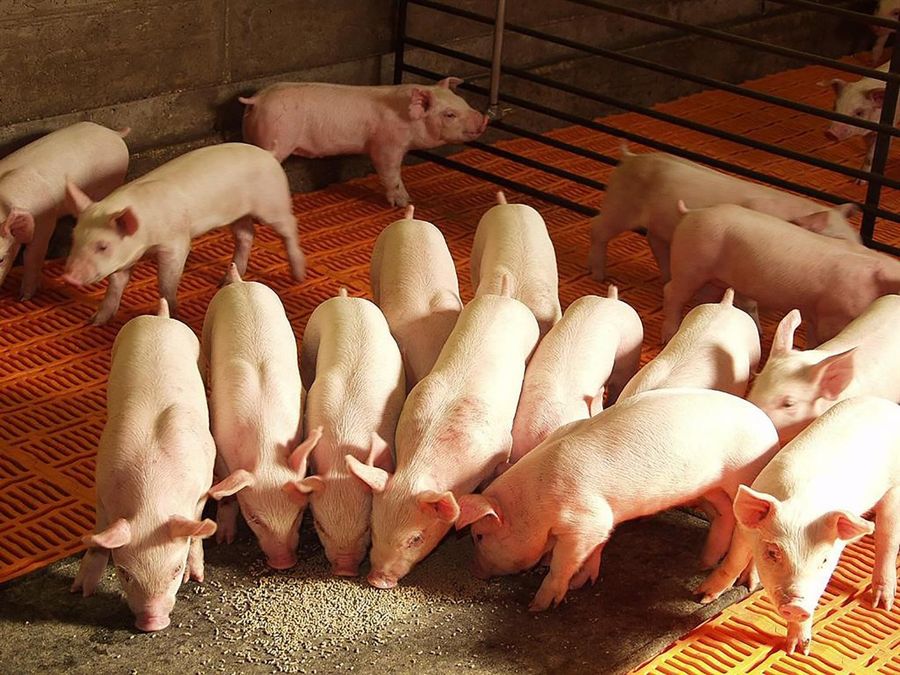Piglets benefit from fermented rapeseed and seaweed

Adding a blend of lacto-fermented rapeseed and seaweed has been observed to benefit gut health for piglets – which could be promising in the search to alternatives to zinc oxide. That was concluded by a team of Danish scientists.
The team noted that supplementation of the blend relieved the gut lymphocyte infiltration of the weaned piglets. In addition, it improved the colon mucosa barrier with altered microbiota composition.
The study was carried out by scientists from the University of Copenhagen, Aarhus University and European Protein, all from Denmark. The results were recently published in the peer-reviewed Journal of Animal Science and Technology. The research was done in context of the imminent banning of the use of therapeutic levels of zinc in piglet feed, leaving an urgent need for substitutes to prevent post-weaning disorders.
The Danish study investigated the effect of using rapeseed-seaweed blend (rapeseed meal, added 2 brown macroalgae species Ascophylum nodosum and Saccharina latissima) fermented by lactobacilli as feed ingredients in piglet weaning. From day 28 of life to day 85, in total 3 groups of 230 piglets each were fed a different regimen. They all received a soy protein concentrate, with:
– 0% lacto-fermented rapeseed-seaweed blend,
– The inclusion of 2.5% lacto-fermented rapeseed-seaweed blend; and
– The inclusion of 5% lacto-fermented rapeseed-seaweed blend.
In that period, the team did not find any significant difference of piglet performance among the 3 groups. From a subset of 10 per treatment, the scientist team took blood samples for haematology, biochemistry and immunoglobulin analysis, colon digesta for microbiome analysis, and jejunum. The team also collected colon tissues for histopathological analyses.
The piglets fed with 2.5% of the blend showed alleviated intra-epithelial and stromal lymphocyte infiltration in the gut, plus an enhanced colon mucosa barrier relative to the group that hadn’t been given the blend.
The result of the study showed that piglets fed a standard diet supplemented with 2.5% fermented rapeseed and seaweed had a more diverse microbiome, a reduced number of intra-epithelial lymphocytes, indicating reduced inflammation. In addition, their blood contained less blood urea nitrogen relative to the piglets fed the unsupplemented diet.
The team also measured the mucosal layer or gut barrier. Results showed that piglets fed a diet supplemented with 2.5% fermented rapeseed and seaweed had a thicker mucous layer in the colon than piglets fed the feed without the blend. The mucus layer helps to keep bacteria away from the colon epithelial layer, which separates the gut and the bloodstream.
A diverse gut microbiome is considered to be a good general indicator for gut health. In a press release by European Protein, Dennis Sandris Nielsen, professor in microbiology at the University of Copenhagen, was quoted to say: “If you compare the gut to a bus, a diverse composition of bacteria can take up the seats. As a result, pathogenic bacteria or other bacteria negatively influencing the piglets will have difficulties colonising when all seats are taken, making the piglets less susceptible to infections.”
The trial showed that piglets fed fermented rapeseed and seaweed had more Prevotella-bacteria in their gut microbiome. That type of bacteria helps digest fibrous feed. When the fibre-degrading bacterium Prevotella stercorea breaks down fibre, it produces short-chain fatty acids, which are involved in many processes beneficial to the piglet.
Read also
Join with the EARLY RATE – 22 International Conference BLACK SEA GRAIN.EUROP...
Ukraine has already exported 80% of the forecasted volume of rapeseed
Australia increased wheat exports by 20% in October
Palm oil prices fell by 5.4% despite lower forecasts for production, exports and s...
Ukrainian ports handled over 90 mln tons of cargo since the beginning of the year
Write to us
Our manager will contact you soon



